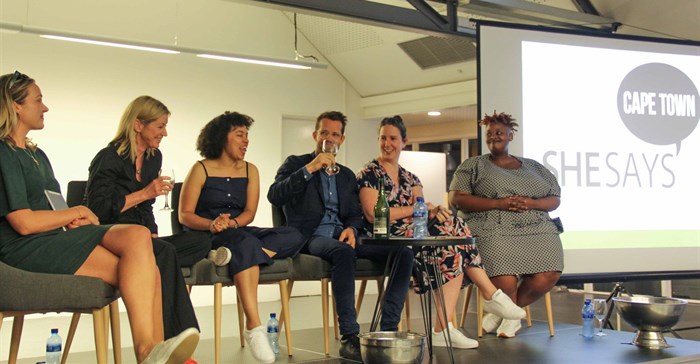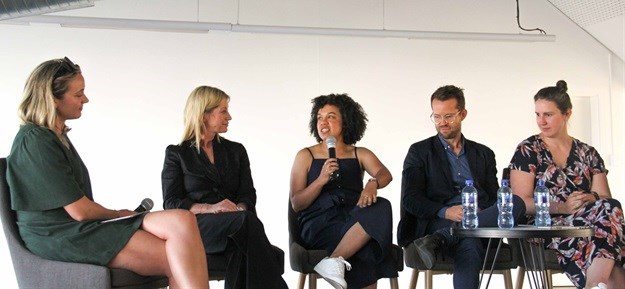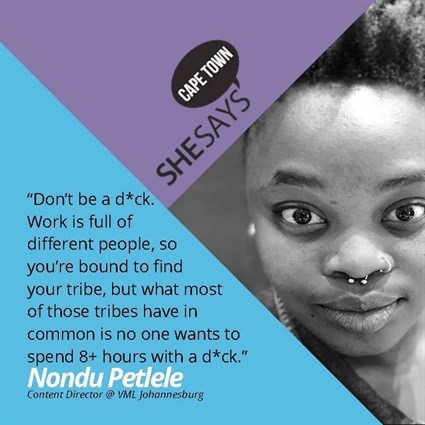What do some of the most sought-after companies look for when hiring talent? SheSays invited a panel of top ad agencies to answer this question and to share how you can best present yourself to snag that dream job - whether you're starting out, moving onto senior management or making a sideways shift.

Panel moderator: Annette Muller. Speakers: Larissa Elliott, a freelance art director/creative director, Vicki Buys, the MD Ogilvy Cape Town, Matt Ross, executive creative director for King James Group, Tabitha King head of talent at King James Group and Nondu Petlele, content director for VML (not in the picture).
In the second part of the discussion, the panel spoke about the relevance of LinkedIn and social media and how women, specifically, can gain greater confidence when going for interviews or asking for that promotion.
The speakers included Vicki Buys, MD of Ogilvy Cape Town, Larissa Elliott, a freelance art director/creative director, Nondu Petlele, content director for VML, Matt Ross, ECD for King James Group and Tabitha King head of talent at King James Group. The panel was moderated by Annette Muller, founder of Flexyforce.
How to keep those confidence levels up
Muller: I read somewhere that when men apply for a job, they look at the job description and even if they can't do 90% of it, they say in the interview, 'Yeah, I can do it all', whereas the women say, 'In the job description there were two things I'm not sure that I can do'.
So, for the ladies on the panel, how have you kept your confidence levels up when going into an interview or having a difficult conversation with your manager about that promotion?
King: I think our industry is quite unique because the really good people that I have worked with and had the pleasure of crossing paths with over the last couple of years are innately insecure and this is what makes them brilliant. They suffer from imposter syndrome. See, they wake up every morning still thinking, 'Can I actually do this?', 'When am I going to be found out?' But they are brilliant. I think that's the part that keeps them passionate.
That nugget of insecurity, that rub of fear of underperformance makes them overperform.
Elliott: Just to add to the part where Annette said that women will worry about the two things on the CV that they are not qualified for. I don't think that's a negative thing. I think it's quite important that we do overprepare. I think it's okay, especially if you recognise that these are the things that I am nervous about. So be prepared for those. And once you're inside the building, hopefully, if you get the job, your work will justify those complications. Just focus on the work.
Petlele: I think it is about being yourself. It's very tough to get into this situation and honestly, I still haven't cracked it. And that's the thing. It's such a scary thing, for example in terms of money. Money isn't necessarily something that we've been taught that you should be comfortable speaking about.
Because the moment you ask for more money, it seems that you feel like you're better than this. But honestly, this is work. No one is doing anyone a favour here. As tough as it is, I feel like sometimes we just need to be ourselves and go get it.
An interview is like a speed-date
Muller: From a commercial perspective, when you hire, what's the thought process around the value that you believe someone can add to the business, that you can see during an interview?
Buys: It's so hard, I'm not going to lie. Interviewing someone is like going on one speed-date and getting married. Sometimes you get it so right and sometimes you get it so wrong. But your gut is a muscle and you have to exercise it. And you also have to take a chance every now and again.
I think a lot is chemistry in an interview and chemistry isn't necessarily confidence. It's the feeling you get, it's the kind of conversation you're having, it's the quality of the conversation, it's the type of questions that they ask.
Because it's true, we're here to make money. Let's have a business conversation. Let's talk about where you are going and what it is you want. Why do you want to come and work at Ogilvy? Why do you want to work at King James or VML? It's not just, 'I'd like a job in advertising', because you can get a job in advertising anywhere. Why do you want to work for this specific company? So, it's about the quality of the conversation.
King: There is a misconception that women have a tendency to not want to talk about money. Let me tell you, in my experience of interviewing and talking about remuneration men are exactly the same. Money is a humanly universal tough topic to talk about. What's really important to consider when you are pitching yourself in the marketplace:
- Do your research.
- Look at benchmarks in the industry, benchmarks against your area of expertise.
- The time that you have had that position.
Take all of these things into consideration and then be ballsy. If you think you're worth it and you've done your research and you feel that there's a confident expectation to look forward to, then put it forward and put it forward soon.
So that no time is wasted during the dating and the pre-dating phase, when some reach the end of four weeks or five weeks and look at their salaries and go, 'Oh my, that's not going to work moneywise'. And now you've wasted a lot of your time.
The relevance of LinkedIn and social media
Muller: What particularly stands out to you when you're looking through a bunch of CVs and what is the relevance of LinkedIn?
King: From a recruiting point of view, social media has changed everything. I feel for recruitment agencies in this day and age. I think LinkedIn has absolutely made finding people a lot easier. It's also made it easier for candidates to market themselves. But there are some things you have to watch out for. Because, yes, what you put up on LinkedIn needs to be true. This is a small industry.
I stumble across people's profiles on LinkedIn that are completely different from when they used to work with us. And it couldn't have happened in two days. So, LinkedIn is an incredibly powerful tool. But use it correctly. Be honest about what you do and who you are, be forthright about your experience, get those recommendations.
But do know that people are going to stalk you on social media anyway. So, whatever you put on LinkedIn, they will probably find you on Facebook as well. There's nowhere to hide anymore.
Muller: What's your take on social media and presenting yourself and selling yourself? What tips and tools do you have for the audience around leveraging social media to land a job?
Petlele: In terms of when we are looking for someone, I definitely do go through their social media pages. Because social media will tell us the type of person that you are. Especially if you're someone that I am trying to work with. Think people don't go on your pages? We go everywhere. So be careful about what you put out there but still be truthful. So, be able to stand by what you put out there.
Ross: The best representation of yourself is on social media. What we are most interested in, yes is the talent, because we're a functioning business and we need to have talented people there. But similarly, we want to know how you're going to react at 3am when you are on a pitch and things aren't going well. Are you going to turn into a complete psychopath or are you just going to leave?
That is the other end of the spectrum and it's as important as the talent spectrum. The only way that we can know that is really through references. Networking and references are as important as anything you presented to the world.

Panel moderator: Annette Muller. Speakers: Larissa Elliott, a freelance art director/creative director, Vicki Buys, the MD Ogilvy Cape Town, Matt Ross, executive creative director for King James Group, Tabitha King head of talent at King James Group.
In closing
Muller: One last practical insight that you can give to the audience and to those who are looking to advance in their careers?
King: Sheryl Sandberg really nailed it when she said:
If you're offered a seat on a rocket ship, don't ask what seat! Just get on.
That is quite a profound way of saying, if there is something that just feels burningly right and feels like it's an environment that can set you on a course of where you were meant to go, then even if it's not exactly the salary you were expecting, not exactly the title you were expecting, but if there is a sense of this that could be something really magic for you, then just dive in. Just do it.
Elliott: If you can do a very honest audit of yourself and find out what you really want to get out of your career, don't be scared to share that with your employers, your boss, anyone that you report to. I think if you don't ask, you don't get. The getting doesn't have to be an immediate thing, it can be a very long journey with your employer but they know exactly what your goal is.
Moss: It is literally the most exciting time to be alive in human history. There are more opportunities and more diversity from a job perspective across the globe than there has ever been. Stay restless. Spend time in other industries and then come back to what you love or explore and find new things. There's not only one career anymore.
Buys: Just don't f*ck around. Decide what you want and decide why you are applying for the job. It doesn't mean that you have to have the full puzzle solved. Just think about what your next step is and what you want to get out of it.
Petlele: Stay hungry. Because that is what drives you. And when you have that drive, anything can happen. You see opportunities where people will never see opportunities. You are seeing things from a very different perspective because you are hungry. So stay hungry and show up. From there you will be surprised what will come out of it.
Wise words we can all learn from. Want to attend a SheSays event? Visit their Facebook, Twitter and Instagram feeds for details.












































